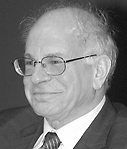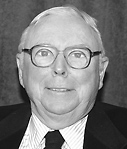A Nobel laureate who helped pioneer a new theory about the psychology of judgment and decision making, an astronomer whose work has led to greater understanding about the formation of galaxies, and one of the world’s leading investment managers are to receive honorary degrees at the U-M Winter Commencement 2010.
Daniel Kahneman, recipient of the 2002 Nobel Prize in economic sciences, will receive an honorary Doctor of Science degree from the university and serve as keynote speaker for the exercises to be held at 2 p.m. Dec. 19 in Crisler Arena.
Also receiving honorary degrees at the ceremony are astronomer Sandra Faber, honorary Doctor of Science degree, and investment manager Charlie Munger, honorary Doctor of Laws degree.
The Board of Regents approved the honorary degrees at its Nov. 18 meeting.
Kahneman, Eugene Higgins Professor of Psychology and professor of public affairs in the Woodrow Wilson School of Public and International Affairs at Princeton University, is considered one of the founders of behavioral economics.

Kahneman
In the late 1960s, he initiated a decades-long collaboration with his colleague Amos Tversky, a graduate of U-M. Together, they applied theories of cognitive psychology to economic forecasting, showing that most people reject complex analysis, instead making economic decisions based on hunches, mood or dogmatic rules-of-thumb. His Nobel Prize was awarded for laying the foundation for a new field of research known as Prospect Theory.
He received his bachelor’s degree in psychology and mathematics from Hebrew University and a doctorate in psychology from the University of California, Berkeley.
Kahneman taught at Hebrew University from 1961-78, during which time he spent a year as a visiting scientist at U-M. He also held faculty positions at the University of British Columbia and the University of California, Berkeley before joining Princeton in 1993.
Kahneman is a member of many prestigious organizations, including the American Academy of Arts and Sciences and the National Academy of Sciences.
His awards include Distinguished Scientific Contribution Award of the American Psychological Association, the Warren Medal of the Society of Experimental Psychologists, and the Hilgard Award for Career Contributions to General Psychology.
Sandra Faber has led a life of discovery in the field of astronomy, particularly in regard to the formation and evolution of galaxies, distant galaxy clusters, and the large-scale structure of the universe. Her early research in the spectra of galaxies and stars led to the discovery of the ways orbital motion help discern the formation of galaxies, with the result that the “Faber-Jackson relation” has become a foundation of the understanding of the origin of galaxies.

Faber
Faber, who will receive an honorary Doctor of Science degree from U-M, holds the position of professor and chair of the Department of Astronomy and Astrophysics at the University of California, Santa Cruz.
As an undergraduate at Swarthmore College, she majored in physics, with minors in mathematics and astronomy. She later entered the graduate program in astrophysics at Harvard University, focusing on optical observational astronomy.
After earning her doctorate, she became the first woman to join the faculty at the renowned Lick Observatory at the University of California, Santa Cruz.
Her research in the evolution of the structure of the universe also led to innovations of the technology used to explore space and matter, making her a leader in the development of astronomical facilities.
Faber has been involved with the Hubble Space Telescope, the W. M. Keck Observatory in Hawaii, and currently with a major survey of distant galaxies (the AEGIS survey).
Her honors include Harvard University’s Bok Prize, the Dannie Heineman Prize for Astrophysics, the Bower Award of the Franklin Institute of Philadelphia, and election to the National Academy of Sciences, the American Academy of Arts and Sciences, and the American Philosophical Society.
Charlie Munger will receive an honorary Doctor of Laws degree for his leadership and vision in the world of finance.
Munger is the chairman of the firm Wesco Financial Corp., and since 1978 has been the vice chairman of Berkshire Hathaway Corp., chaired by Warren Buffett.
Born in Omaha, Neb., he enrolled at the U-M to study mathematics. He served in the U.S. Army Air Corps as a meteorologist during World War II. He also studied at the California Institute of Technology and later earned his J.D. from Harvard Law School.

Munger
He founded the law firm Munger, Tolles & Olson and the investment firm Wheeler, Munger, and Co. As the current chairman of Wesco Financial, he has oversight of a diversified equity portfolio that is studied by investors worldwide.
He authored “Poor Charlie’s Almanack, The Whit and Wisdom of Charles T. Munger,” a compilation of his essays, memoirs, interviews and speeches, which includes a forward by Buffet. The book is modeled after Ben Franklin’s “Poor Richard’s Almanack.”
Munger has continued his ties with U-M. On a recent visit to the Law School, he noticed the need for improved lighting in the law library, so he provided a gift that would support new lighting and infrastructure to the William W. Cook Law Quadrangle. In September he presented a public lecture on the Ann Arbor campus, offering a perspective on the economy that attracted international attention.

